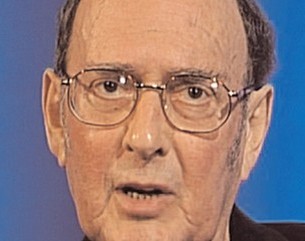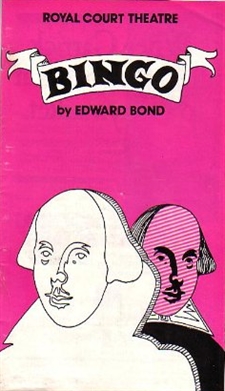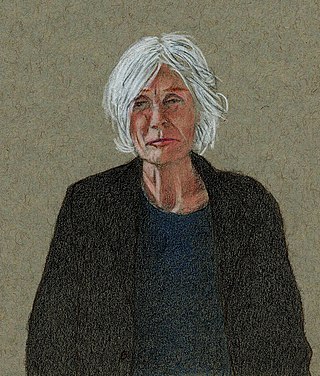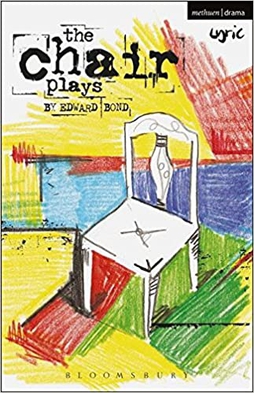
Harold Pinter was a British playwright, screenwriter, director and actor. A Nobel Prize winner, Pinter was one of the most influential modern British dramatists with a writing career that spanned more than 50 years. His best-known plays include The Birthday Party (1957), The Homecoming (1964) and Betrayal (1978), each of which he adapted for the screen. His screenplay adaptations of others' works include The Servant (1963), The Go-Between (1971), The French Lieutenant's Woman (1981), The Trial (1993) and Sleuth (2007). He also directed or acted in radio, stage, television and film productions of his own and others' works.

Edward Bond is an English playwright, theatre director, poet, dramatic theorist and screenwriter. He is the author of some fifty plays, among them Saved (1965), the production of which was instrumental in the abolition of theatre censorship in the UK. Other well-received works include Narrow Road to the Deep North (1968), Lear (1971), The Sea (1973), The Fool (1975), Restoration (1981), and the War trilogy (1985). Bond is broadly considered among the major living dramatists but he has always been and remains highly controversial because of the violence shown in his plays, the radicalism of his statements about modern theatre and society, and his theories on drama.

The Sea is a 1973 play by Edward Bond. It is a comedy set in a small seaside village in rural East Anglia during the Edwardian period and draws from some of the themes of Shakespeare's The Tempest. It was well-received by critics.

Tobias Simpson Menzies is an English stage, television and film actor. He is known for playing Prince Philip, Duke of Edinburgh in the third and fourth seasons of Netflix's series The Crown, for which he won the Primetime Emmy Award for Outstanding Supporting Actor in a Drama Series and received Golden Globe and British Academy Television Award nominations. Menzies also played Frank and Jonathan "Black Jack" Randall in Starz's Outlander, for which he received a Golden Globe Award nomination, in addition to his roles as Brutus in HBO's Rome and Edmure Tully in HBO's Game of Thrones.
Chicken Soup with Barley is a 1956 play by British playwright Arnold Wesker. It is the first of the 'Wesker trilogy' – being followed by Roots and I'm Talking About Jerusalem – and was first performed on stage in 1958 at the Belgrade Theatre in Coventry, transferring later that year to the Royal Court Theatre in London. It is considered to be an important play in the history of post-war British theatre, and one of the few English plays with a sympathetic portrayal of a communist family. The character of Sarah was based on Arnold Wesker's aunt, Sarah Wesker, who was a trade union activist in the East End of London.

Rory Michael Kinnear is an English actor. He won two Olivier Awards, both at the National Theatre, in 2008 for his portrayal of Sir Fopling Flutter in The Man of Mode, and for playing the William Shakespeare villain Iago in Othello in 2014.

Bingo: Scenes of Money and Death is a 1973 play by English playwright Edward Bond. It depicts an ageing William Shakespeare at his Warwickshire home in 1615 and 1616, suffering pangs of conscience in part because he signed a contract which protected his landholdings, on the condition that he would not interfere with an enclosure of common lands that would hurt the local peasant farmers. Although the play is fictional, this contract has a factual basis. Bingo is a political drama heavily influenced by Bertolt Brecht and Epic theatre. Some have praised Bond's portrayal of Shakespeare while others have criticized it.

The Fool: Scenes of Bread and Love is a play by the English playwright Edward Bond. It traces the life of the poet John Clare against the backdrop of the Industrial Revolution, from his roots in rural East Anglia via literary success in London to his final years in a lunatic asylum. The play was first performed at the Royal Court Theatre in 1975, in a production directed by Peter Gill and featuring a cast including Tom Courtenay, David Troughton and Nigel Terry among others.

The Park Theatre opened in Finsbury Park, north London in 2013. It describes itself as "a neighbourhood theatre with global ambition", offering a mixed programme of new writing, classics, and revivals. As well as the main auditorium seating 200, the building includes a 90-seat studio theatre, a rehearsal space and a café bar.

Denise Gough is an Irish actress. She has received a number of accolades for her work in theatre, including two Laurence Olivier Awards as well as a nomination for a Tony Award. Her most internationally renowned screen role is that of Dedra Meero on the Star Wars TV series, Andor.
Blue Heart is two one act plays, written by Caryl Churchill and copyrighted in 1997. The first play, Heart’s Desire, is about a family waiting on the arrival of their daughter Suzy. The second play Blue Kettle, is about a man named Derek who goes around telling women they're his mother because he was adopted at birth. The women believe him and truly find ways to tell him the way he is their son. Blue Heart is highly regarded by critics.

Caryl Lesley Churchill is a British playwright known for dramatising the abuses of power, for her use of non-naturalistic techniques, and for her exploration of sexual politics and feminist themes. Celebrated for works such as Cloud 9 (1979), Top Girls (1982), Serious Money (1987), Blue Heart (1997), Far Away (2000), and A Number (2002), she has been described as "one of Britain's greatest poets and innovators for the contemporary stage". In a 2011 dramatists' poll by The Village Voice, five out of the 20 polled writers listed Churchill as the greatest living playwright.

Jez Bond is a British theatre director. One of the cohort of artistic directors born in the 1960s and 70s who are now running significant UK theatres, he opened the Park Theatre in Finsbury Park, London in 2013.

Sian Clifford is an English actress. She is best known for playing Claire, the older sister of the titular character in the BBC comedy-drama series Fleabag (2016–2019) and also portrayed Martha Crawley in the ITV/Amazon Studios series Vanity Fair (2018). In 2020, she played Diana Ingram in the ITV series Quiz.
Anne-Louise Sarks is an Australian theatre director, writer and actor. She has been the Artistic Director of the Melbourne Theatre Company since October 2021. Her partner is journalist Sean Kelly.
Alice Birch is a British playwright and screenwriter. Birch has written several plays, including Revolt. She Said. Revolt Again. for which she was awarded the George Devine Award for Most Promising New Playwright, and Anatomy of a Suicide for which she won the Susan Smith Blackburn Prize. Birch was also the screenwriter for the film Lady Macbeth and has written for such television shows as Succession, Normal People, and Dead Ringers.
Escaped Alone is a 2016 play by Caryl Churchill. Critics' reviews were mostly positive.
Restoration is a 1981 play by English dramatist Edward Bond that has been described as "simultaneously a Restoration comedy, a parody of Restoration comedies, and a dissection of class privilege in the Restoration era." It premiered at the Royal Court Theatre on 22 July 1981 with the master, his wife, his servant Bob, and Bob's wife played by Simon Callow, Irene Handl, Philip Davis, and Debby Bishop, respectively.

The Chair Plays are a trilogy of plays by English dramatist Edward Bond. The trilogy includes Have I None, The Under Room, and Chair. Have I None was premiered by Big Brum on 2 November 2000 at Birmingham's Castle Vale Artsite. The Under Room was also premiered by Big Brum at MAC in October 2005. Chair was written specially for radio, and while it was written in 2000, its first staged production was in Lisbon, at the Teatro da Cornucópia in June 2005. The London premiere of the entire trilogy was at Lyric Hammersmith, on 19 April 2012. Have I None and Chair received mostly positive reviews, but The Under Room polarized critics.

Olly's Prison is a 1993 play by English dramatist Edward Bond. In it, a man who has killed his daughter and forgotten his crime tries to find meaning in his life. The work divided critics.














